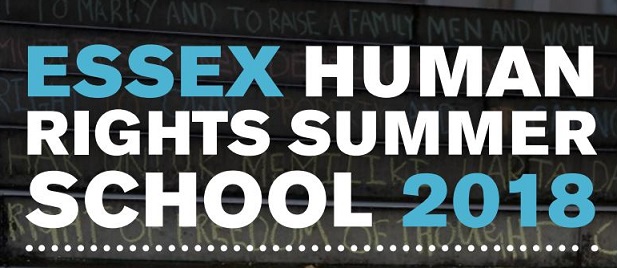University of Essex Summer School on Human Rights Research Methods, 2-6 July 2018

The Human Rights Centre of the University of Essex offers a five-day "Summer School in Human Rights Research Methods" from 2-6 July 2018. The Centre has put together a teaching team of some of the leading Essex and external human rights academics and practitioners, all with extensive experience of researching and working on human rights issues in a wide range of contexts. The summer school is ideal for human rights professionals working in NGOs, government and international organisations; lawyers; academics and postgraduate students.
From the announcement of the Centre
We are delighted to announce the 2018 programme for the Human Rights Centre’s pioneering summer school on Human Rights Research Methods. Since the launch of the summer school in 2014, there has been growing recognition of the importance of paying attention to methodology in human rights research, especially with the increasing emphasis on evidence and on assessing and enhancing the impact of human rights. While academics, non-governmental organisations (NGOs) and intergovernmental organisations such as the United Nations carry out vast amounts of research, very little attention has traditionally been paid to methodology in human rights. However, the strength, persuasiveness and legitimacy of research findings and, in turn, the ability of such findings to influence policy and practice will be greatly enhanced by methodological rigor. Run over 5 days, the Research Methods summer school provides the core methods and skills needed to carry out human rights research whether for academic scholarship, bids for large research projects or reports for NGOs, governments and international organisations. Participants will learn how to design research projects and carry them out both in a headquarters environment or while working in the field. They will learn about the range of tools and methodologies for human rights research (whether academic or practical) and when, why and how to employ particular research methods in specific research contexts. The summer school not only focuses on documenting human rights violations using qualitative and quantitative research methods but it also addresses questions of how to measure the impact and effectiveness of policies and practices based on human rights. It is an essential course for postgraduate students, academics, lawyers and human rights professionals working in NGOs, government and international organisations. Participants in previous years have expressed strong satisfaction with the content and the delivery of the programme and the demand for places has remained high.
The summer school will be taught by a combination of Essex and external human rights academics and practitioners. The team includes:
- Judith Bueno de Mesquita, School of Law & Deputy Director, Human Rights Centre Clinic.
- Dr. Richard Carver, Senior Lecturer in Human Rights and Governance, CENDEP, Oxford Brookes University (tbc)
- Barbora Cernusakova, Researcher at Amnesty International and University of Manchester
- Dr. Cosette Creamer, Benjamin E. Lippincott Chair in Political Economy & Assistant Professor of Political Science, Department of Political Science and School of Law, University of Minnesota.
- Sam Dubberly, Human Rights, Big Data and Technology Project, University of Essex
- Dr. Carla Ferstman, Senior Lecturer, School of Law, Former Director of REDRESS.
- Dr. Lisa Handley, Visiting Research Academic, CENDEP, Oxford Brookes University
- Prof. Paul Hunt, Human Rights Centre and School of Law, University of Essex and former Senior Human Rights Advisor to the World Health Organization Assistant Director-General; UN Special Rapporteur on the Right to Health and Rapporteur of the UN Committee on Economic, Social and Cultural Rights
- Dr. Patrick Lown, EssexLab, Department of Government, University of Essex.
- Esther Major, Consultant for WHO & former Researcher/Adviser at Amnesty International
- Prof. Lorna McGregor, School of Law, Director Human Rights Centre & Co-Director, Human Rights, Big Data and Technology Project. Member, Equality and Human Rights Commission.
- Dr. Róisín Ryan-Flood, Department of Sociology, University of Essex
- Prof. Clara Sandoval, Human Rights Centre, Director, Essex Transitional Justice Network, and Senior Lecturer, School of Law, University of Essex.
- Dr. Ahmed Shaheed, Human Rights Centre & School of Law, University of Essex. UN Special Rapporteur on the Freedom of Religion or Belief (2016-19)
- Dr. Gary Williams, Research Development Manager, Faculty of Social Sciences, University of Essex.
Teaching sessions will be on following topics
Qualitative Data Analysis; Interviewing Survivors of Human Rights Violations; Single and Comparative Case Studies; The Use of Focus Groups; Conducting In-Country Research; Human Rights Indicators; The Role of Databases; Socio-Economic and Administrative Statistics; Surveys; Counting Rights Violations; Experiments; Measuring the Impact of the Right to Health; Documenting Harm and Claiming Reparations; Choosing between Quantitative and Qualitative Methods; One-on-One Clinics.
► For more information and application
► Short video on Summer School
Source: University of Essex Human Rights Centre
13.03.2018

